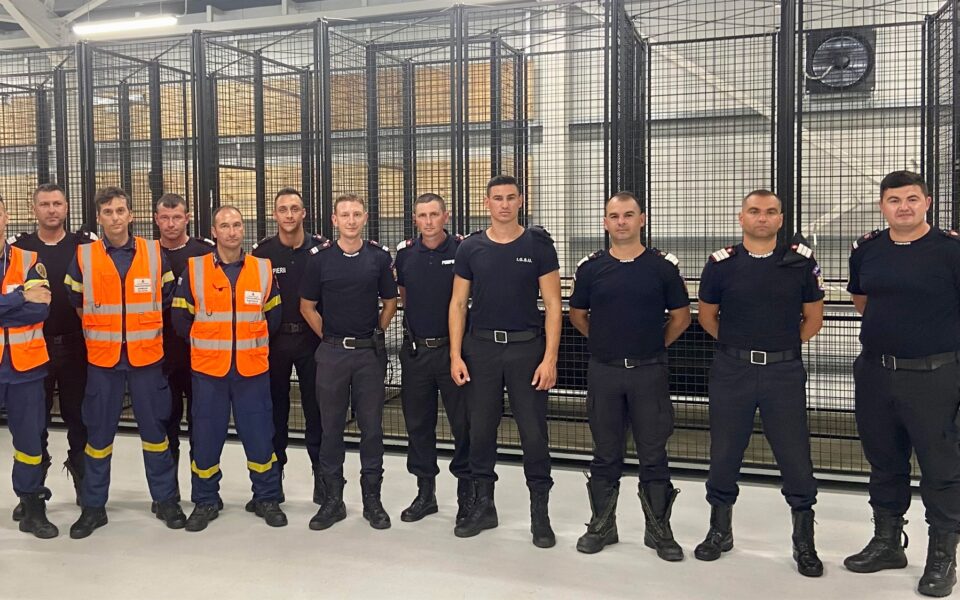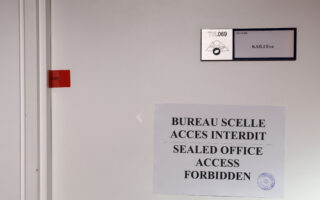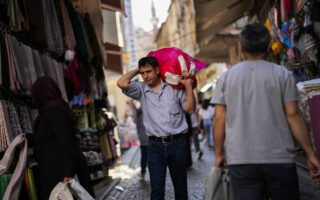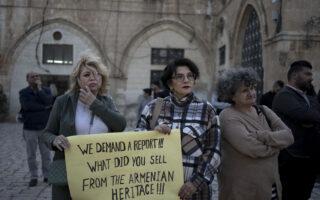EU firefighters join Greek colleagues
Kathimerini pays visit to SNF Hellenic Fire Corps Training Center to watch drills

It’s midday on Friday, July 7, and the phone rings on the desk of Vasileios Bikas, the coordinator for foreign detachments at the Stavros Niarchos Foundation (SNF) Hellenic Fire Corps Training Center. The call is about a blaze in brushland in the East Attica town of Keratea that may not be threatening houses but has the fire service on alert. The call conveys orders for the Romanian and Greek firefighters at the facility to get ready in case their assistance is required.
Preparations get under way as soon as the orders are conveyed to the heads of the teams. In Greece with a team of 39 colleagues as part of a prepositioning program for detachments of European firefighters in blaze-prone member-states run by the EU Civil Protection Mechanism, the head of the Romanian force knocks on the coordinating officer’s door to be briefed on the location of the fire. They study the interactive map and how they would reach the spot.
“Don’t let them out of your sight; the area is full of wells, so they need to watch their every step,” Brigadier Bikas tells the foreign detachment liaison, Konstantinos Kapsalis.
As the firefighters board their trucks, the phone rings again, telling them to stand down. The Greek and Romanian team leaders shake hands, happy at the excellent cooperation, even though they did not need to respond to the blaze after all.
[The Romanian contingent was eventually deployed in East Attica on July 17-18 where a large wildfire consumed swaths of forestland surrounding at least three towns.]
The Romanian firefighters that are here to help their Greek colleagues and exchange expertise and know-how are not the only detachment from another EU member-state in the country right now.
“As we speak, apart from the Romanians in Athens, there are Bulgarian firefighters in Thessaloniki and Germans in Ancient Olympia. The former will be followed by another team from Romania and then another from France, while those at Olympia will be replaced by Maltese and Slovakian firefighters,” says Bikas, adding that each detachment comes to Greece with its own trucks and equipment.
The Romanian brigadier and team leader David Valerion and fire captain Dobu Dragos have been in Athens at this point for around 10 days, though this is not the former’s first time in Greece.
“I’ll never forget the battles I have fought with the Greeks. My Greek colleague Kostas Zinelis and I did battle with the flames in the big fire on Mount Penteli last year. That was a fire I will never forget. I had never seen anything like it in terms of size or the speed at which it moved. I really understood what the Greek climate and temperature means with this fire,” says Valerion, looking at his Greek colleague, with whom they managed to save at least six homes.
‘Making sure that 40 come and 40 go is the most important thing – that no one is lost’
Dragos, for his part, sees his Greek colleagues as having more valuable experience to share in managing wildfires.
“We don’t get so many non-urban fires in our country, nor do we have a climate and temperatures similar to Greece, so we don’t know exactly how to react in the event of a wildfire. This is why we’re trying to learn as much as we can from our Greek colleagues. The cooperation has been great and we want to thank them for their hospitality and support,” he adds.
Simulations
Showing us what the firefighters do at the training center in Nea Makri, East Attica, when they’re not responding to actual fires, Bikas invites us into a room where indoor simulations are held. It is here that they are trained in combating blazes in small, hard-to-reach spaces, with smoke machines and special effects making the experience seem realistic.
In another room, firefighters practice extinguishing a fire on a truck carrying flammable materials, as well as what to do in other emergencies like an earthquake or factory blast.
“Before this program, if we needed assistance – knock on wood – from a neighboring country, it would take an average of two days for the reinforcements to arrive. Now, apart from training, the aim of the program is to ensure that foreign detachments are available here in the event that they are needed. Two hundred firefighters from six different countries will be coming to Greece between July 1 and August 30 overall. They will be here to help us battle wildfires if this becomes necessary,” says Bikas, adding that 405 firefighters from 11 countries are taking part in the EU’s prepositioning program.
He also notes how valuable the experience of learning to work in a different country, where the weather conditions and terrain are unfamiliar, can be.
“Last year, the Finns told us that they had never seen a water-dropping aircraft help in a blaze and the Norwegians had never used a hose with a small diameter,” says Bikas, adding that the Greek side has also learned a lot from its foreign guests in terms of organizational structure and coordination.
The responsibility of hosting these teams is also significant, he says.
“Making sure that 40 come and 40 go is the most important thing – that no one is lost,” stresses Bikas.
The Greek fire brigadier is also looking forward to the opportunity to train in another country as part of the program.
“I would personally choose a country that has new things to offer. Our German colleagues are excellent in administrative management, for example, so I’d like to see how they work. Our French colleagues, on the other hand, specialize in crisis response and management, so I’d also learn a lot from them too,” he says.





